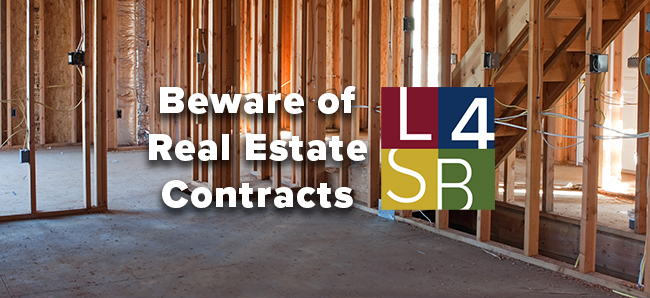Although more common on the residential side, business owners sometimes sign real estate contracts instead of mortgages as a way to get into the property fast. Real estate contracts may seem ideal for individuals or businesses who aren’t able to purchase property outright. However, before buying through a contract, there are some serious pitfalls to be aware of.
What are real estate contracts?
A real estate contract is an installment contract directly with the owner of the property. They are often seen as a “quick fix” solution by people whose credit won’t allow them to borrow from a bank. You usually pay a deposit up front, then pay the owner every month, either personally or through an escrow company. The owner records a copy of the real estate contract so that your interest shows up on title. As long as you make the payments, you get to use the property, just like an owner would. Once the contract is paid off, the owner transfers title to you and you own the property.
What’s the hitch with real estate contracts?
There are several. First, when the real estate contract is executed, a copy is supposed to be recorded so that it shows up on a title report. If this isn’t done, then you have no recorded interest in a property you’ve paid good money for. It can also complicate things at the end of the process, when the owner is supposed to provide you the deed for the property. If they fail to do this, your only real option is to take them to court and prove both that you have a contract and that you paid it off. Sometimes, sketchy people enter into real estate contracts, collect the payments and disappear, leaving the property to be foreclosed on. It can be difficult and expensive to go after them, because this is something that would probably need to be handled by a lawyer, and because they most likely no longer have your money.
Second, properties conveyed through real estate contract are usually already mortgaged. This means that somewhere there’s a bank who has priority over your real estate contract, even if your contract is properly recorded. The money from the contract is supposed to pay the mortgage, but it doesn’t always work out that way. If the mortgage goes into foreclosure, you could find your property foreclosed on. Your only remedy for the money you paid would be to go after the owner personally, but again, they might prove hard to collect from.
Third, a lot of mortgages include language that if the owner enters into one, their mortgage is automatically in default. This, surprisingly, is not that big an issue, but it does mean you may be contracting for a property whose mortgage is already in default.
Fourth, the mortgage continues to exist until it is paid off, even if you complete your real estate contract and transfer title into your name. If you transfer title and the mortgage hasn’t been paid off and released, you will have to find a way to resolve that, and the bank can still foreclose on you if their loan goes into default.

What if you decide you want out partway through?
That’s tricky. You don’t really own the property yet, so you can’t transfer an interest in the property itself. Unless the contract says otherwise, you may theoretically be able to transfer your interest in the real estate contract, although you would want to be extremely careful that the buyer knows exactly what they are getting. You should consult with an attorney, if possible, to review the contract and make sure you know what interests you can and cannot convey at sale.
What if I default?
Normally, in New Mexico, when a property owner defaults, banks are required to foreclose judicially. This means that they have to file a complaint, serve a copy on the owner and any other involved parties, get judgment from the court, file and publish a notice of sale, and then hold a public auction. This is a months-long process overseen by a judge, ending in a public sale of the property, and possibly, eviction. With a real estate contract, if the payments are not being made, the owner can terminate the real estate contract and record the deed back to themselves. From there, they can file for eviction. The foreclosure process on a real estate contract involves far less time and oversight than a traditional foreclosure.
Final thoughts
Either look at other real estate on the market or save your hard-earned money for later. If something goes wrong with the contract, you could find yourself out the money but with no property, and worse, your business could take a hit if you lose your premises to an eviction or foreclosure. But if you’re really determined, use a broker or escrow company to handle the money instead of paying it to the owner directly. Always get a title search so you know what mortgages or other lien creditors are out there, and make sure that they will be paid off on or before the end of the contract, so when you get the property, you really own it free and clear. When it comes to large purchases like real estate, consult with an attorney to discuss your options.
Ready to speak to an Attorney?
Contact us or give us a call at 505.715.5700
Law 4 Small Business, P.C. (L4SB).
A little law now can save a lot later.
A Slingshot company.




